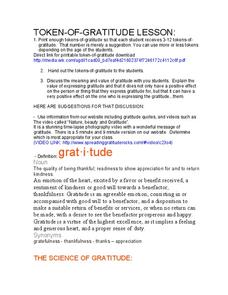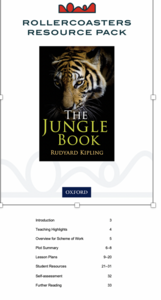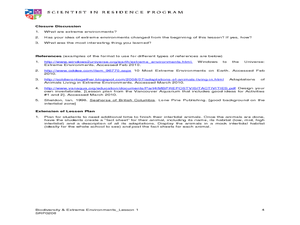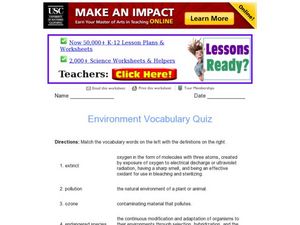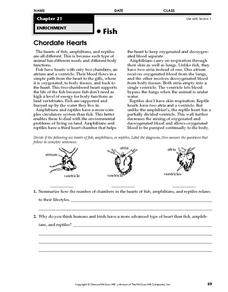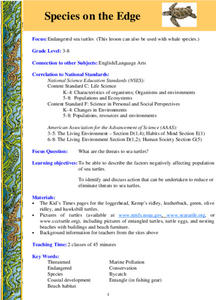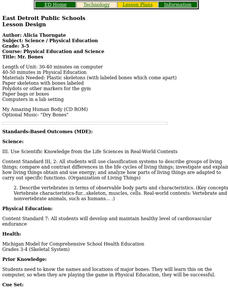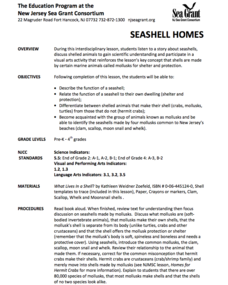K12 Reader
Taiga Ecosystems
Introduce your class to another type of ecosystem, the taiga ecosystem, through a reading passage. Class members read the text and then respond to five reading questions about the content of the passage.
Lee & Low Books
Classroom Guide for Sacred Mountain: Everest
The most famous climbers of Mount Everest could never have made it to the summit without the assistance of the local Sherpa. Christine Taylor-Butler's nonfiction children's book Sacred Mountain: Everest is the focus of an extensive...
Spreading Gratitude Rocks
Token of Gratitude
What would the world be like if everyone expressed gratitude? Pupils explore the concept by watching a motivating time-lapse video. Scholars express appreciation by handing out tokens of gratitude, and then write about their...
Oxford University Press
The Jungle Book
Most every teacher dreams of a ready-to-teach and print book study. Well, here it is! The Jungle Book novel resource includes 12 complete lessons studying poetry, author's craft, themes, characters, and more. Scholars role play,...
K12 Reader
Endangered Species
Your learners have likely heard about animals going extinct. By reading this passage, they can find out some reasons why this happens and how to protect endangered species. After reading, individuals respond to five related questions.
Curated OER
Have to Have a Habitat
Students create a zoological and botanical garden made up of a variety of species from around the world.
Curated OER
Extreme Environments
Students examine extreme environments and the characteristics that make them. In this adaptation instructional activity students see how animals have adapted to these environments.
Curated OER
Insect Crossword Puzzle
In this insect crossword puzzle instructional activity, students complete a crossword, using clues about insect parts, habitats, physical appearance and so on.
Curated OER
Ecosystems - Plants and Animals Together
Students study the biotic and abiotic factors of an environment. For this exploratory lesson students examine the different trophic levels and how organisms are connected.
Curated OER
Let's Sort a Salad
Learners examine edible plants by identifying salad ingredients. In this botany lesson, students discuss the different vegetables that can be eaten in a salad and draw them on a worksheet. Learners review vegetable vocabulary and examine...
Curated OER
What Do Snails Eat?
Students conduct a food choice experiment with snails, recording the results on a chart to determine what snails eat. In this what do snails eat lesson, students color a picture of snail anatomy, perform the experiment with 3 food...
Curated OER
Environment Vocabulary Quiz
In this environment vocabulary activity, students draw lines to match 13 words to their definitions in another column. Words pertain to the environment. Examples: biosphere, habitat, greenhouse effect, smog.
Curated OER
Chordate Hearts
In this chordate hearts worksheet, students read a passage describing the differences of the hearts of fish, amphibians, and reptiles. After reading, students label diagrams and answer questions.
Curated OER
Forest Ecosystem Field Trip
Students investigate the environment by participating in a class field trip. In this botany lesson, students attend a field trip through their local park or forest while listening to a nature guide. Students practice using their 5 senses...
Curated OER
Ocean Vocabulary
In this vocabulary worksheet, students match words related to the ocean to their definitions. Worksheet is labeled as a quiz, but may be used as review/practice.
Curated OER
Forest Ecology
Learners examine the different plants and animals in British Columbia. In this forest ecology lesson students explore how ecosystems work, classify animals and investigate food webs and chains.
Curated OER
Sunken Millions
This PowerPoint features a game based on the animal life. The interactive slides include 20 questions about animal needs, animal groups, and animal traits. The questions include multiple choice answers and 4 different levels of...
Curated OER
Insects Around Us
Students fill out worksheets about insects and how they are helpful to our world. In this insects lesson plan, students learn about flower parts and insects that pollinate them.
Curated OER
Decomposers- Nurse Logs
Students investigate temperate forest ecosystems. In this environmental activity, students discover different forms of decomposition and its effect on the environment.
Curated OER
Species on the Edge
Students describe factors negatively affecting population of sea turtles, and identify and discuss action that can be undertaken to reduce or eliminate threats to sea turtles and other endangered species.
Curated OER
Mr. Bones
Students play CD-ROM game My Amazing Human Body, and participate in relay game in Phys. Ed. where they put together skeleton on which body parts are labeled.
Curated OER
Seashell Homes
Pupils listen to a story about seashells. They discuss shelled animals. Learners describe the function of seashell. Pupils relate the function of a seashell to their own dwelling. They differentiate between shelled animals that make...
Curated OER
Abiotic and Biotic Factors
Students examine abiotic and biotic factors. They define biotic and abiotic, categorize a list of items onto a Venn diagram, label various items from areas on the school grounds as biotic or abiotic, and diagram a magazine picture.
Curated OER
Adaptable Mandibles
Young scholars define adaptation and highlight example of adaptation in birds and other animals. They study feeding techniques of seabirds and investigate the effect that trash has on wildlife.


